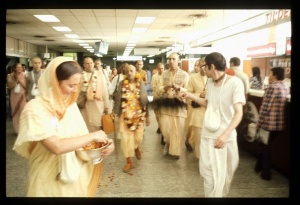CC Madhya 25.196: Difference between revisions
m (1 revision(s)) |
No edit summary |
||
| Line 1: | Line 1: | ||
{{ | [[Category:Sri Caitanya-caritamrta - Madhya-lila Chapter 25|C196]] | ||
<div style="float:left">'''[[Sri Caitanya-caritamrta|Śrī Caitanya-caritāmṛta]] - [[CC Madhya|Madhya-līlā]] - [[CC Madhya 25|Chapter 25: How All the Residents of Vārāṇasī Became Vaiṣṇavas]]'''</div> | |||
<div style="float:right">[[File:Go-previous.png|link=CC Madhya 25.195|Madhya-līlā 25.195]] '''[[CC Madhya 25.195|Madhya-līlā 25.195]] - [[CC Madhya 25.197|Madhya-līlā 25.197]]''' [[File:Go-next.png|link=CC Madhya 25.197|Madhya-līlā 25.197]]</div> | |||
{{CompareVersions|CC|Madhya 25.196|CC 1975|CC 1996}} | |||
{{RandomImage}} | |||
==== TEXT 196 ==== | ==== TEXT 196 ==== | ||
<div class="verse"> | |||
<div | :keha kahe,—ei nahe, 'alpa' doṣa haya | ||
keha kahe,—ei nahe, | :śuniyā rahilā rāya kariyā saṁśaya | ||
śuniyā rahilā rāya kariyā saṁśaya | |||
</div> | </div> | ||
| Line 13: | Line 16: | ||
==== SYNONYMS ==== | ==== SYNONYMS ==== | ||
<div class="synonyms"> | |||
<div | ''keha kahe''—some of the learned ''brāhmaṇas'' said; ''ei''—this; ''nahe''—not; ''alpa''—insignificant; ''doṣa''—fault; ''haya''—is; ''śuniyā''—hearing; ''rahilā''—remained; ''rāya''—Subuddhi Rāya; ''kariyā''—making; ''saṁśaya''—doubt. | ||
keha | |||
</div> | </div> | ||
| Line 21: | Line 23: | ||
==== TRANSLATION ==== | ==== TRANSLATION ==== | ||
<div class="translation"> | |||
<div | |||
When Subuddhi Rāya consulted some other brāhmaṇas, they told him that he had not committed a grievous fault and that consequently he should not drink hot ghee and give up his life. As a result, Subuddhi Rāya was doubtful about what to do. | When Subuddhi Rāya consulted some other brāhmaṇas, they told him that he had not committed a grievous fault and that consequently he should not drink hot ghee and give up his life. As a result, Subuddhi Rāya was doubtful about what to do. | ||
</div> | </div> | ||
| Line 28: | Line 29: | ||
==== PURPORT ==== | ==== PURPORT ==== | ||
<div class="purport"> | |||
This is another instance of Hindu custom. One ''brāhmaṇa'' would give advice condoning a particular fault, and another would give advice to the contrary. Typically, lawyers and physicians differ, giving one kind of instruction and then another. Due to the ''brāhmaṇas'' ' different opinions, Subuddhi Rāya became further perplexed. He did not know what to do or what not to do. | |||
</div> | |||
<div | <div style="float:right; clear:both;">[[File:Go-previous.png|link=CC Madhya 25.195|Madhya-līlā 25.195]] '''[[CC Madhya 25.195|Madhya-līlā 25.195]] - [[CC Madhya 25.197|Madhya-līlā 25.197]]''' [[File:Go-next.png|link=CC Madhya 25.197|Madhya-līlā 25.197]]</div> | ||
__NOTOC__ | |||
</div> | __NOEDITSECTION__ | ||
__NOTOC__ | |||
Revision as of 15:01, 18 September 2021

A.C. Bhaktivedanta Swami Prabhupada
TEXT 196
- keha kahe,—ei nahe, 'alpa' doṣa haya
- śuniyā rahilā rāya kariyā saṁśaya
SYNONYMS
keha kahe—some of the learned brāhmaṇas said; ei—this; nahe—not; alpa—insignificant; doṣa—fault; haya—is; śuniyā—hearing; rahilā—remained; rāya—Subuddhi Rāya; kariyā—making; saṁśaya—doubt.
TRANSLATION
When Subuddhi Rāya consulted some other brāhmaṇas, they told him that he had not committed a grievous fault and that consequently he should not drink hot ghee and give up his life. As a result, Subuddhi Rāya was doubtful about what to do.
PURPORT
This is another instance of Hindu custom. One brāhmaṇa would give advice condoning a particular fault, and another would give advice to the contrary. Typically, lawyers and physicians differ, giving one kind of instruction and then another. Due to the brāhmaṇas ' different opinions, Subuddhi Rāya became further perplexed. He did not know what to do or what not to do.